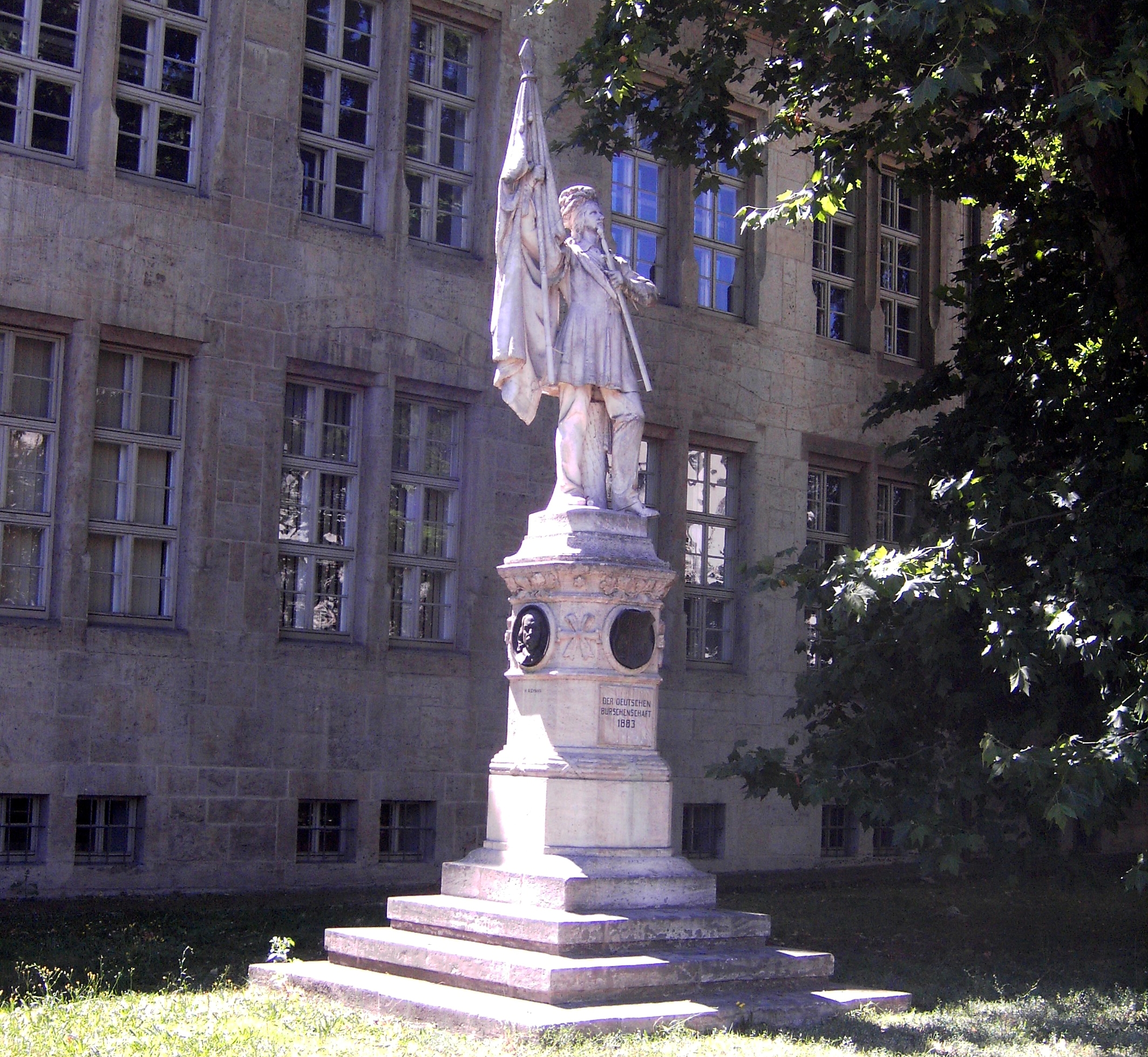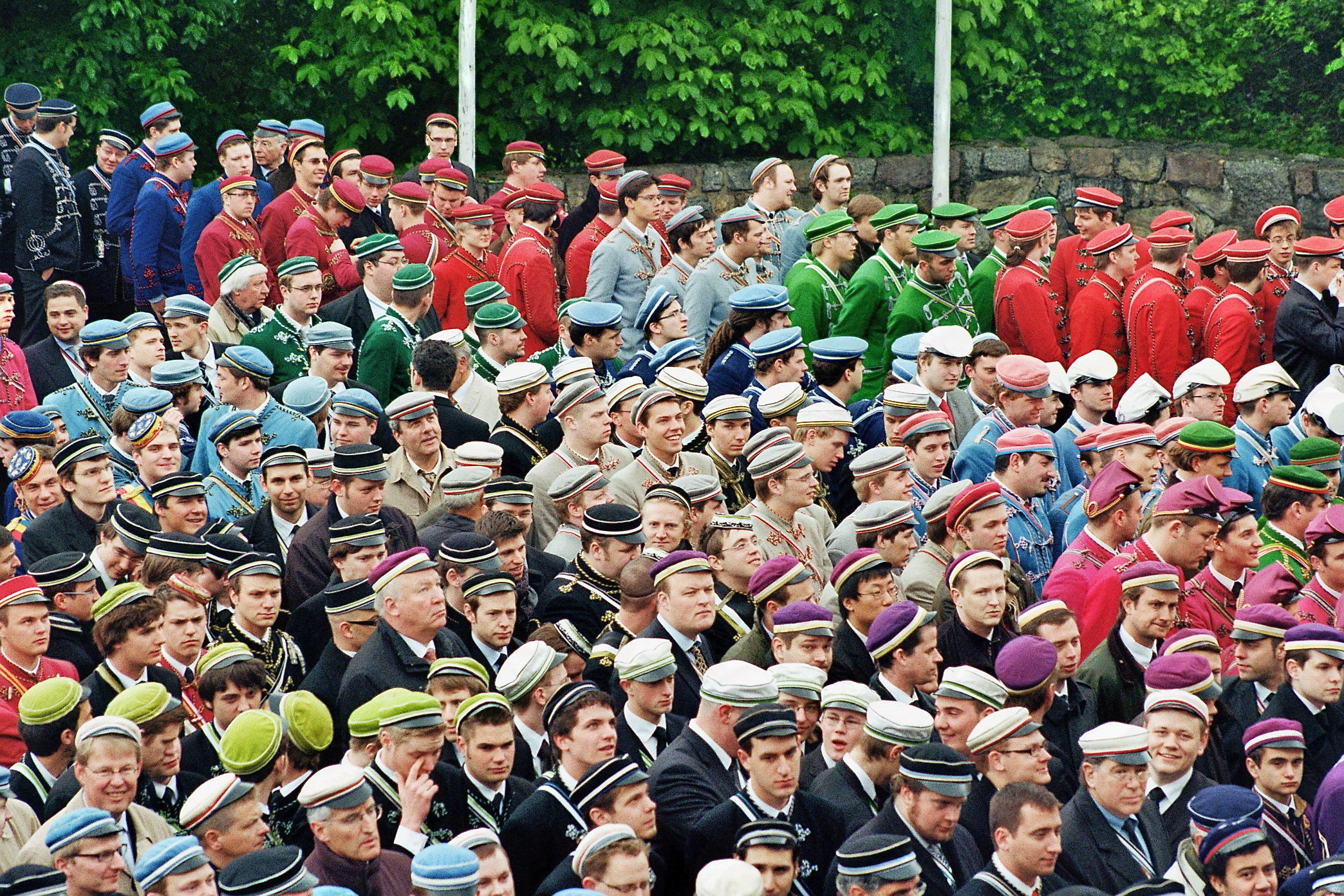|
Urburschenschaft
The Urburschenschaft () was the first ''Burschenschaft'', one traditional form of German student fraternities. It was founded in 1815 in Jena, Thuringia, in Germany. As colours, following their initial use in a state flag by the elder Reuss noble line in 1778 but having no known connections to that event, the ''Urburschenschaft'' adopted Black-Red-Gold, later to become the National colours of Germany. Many founding members of the Jena Burschenschaft had been fighting in the Lützow Free Corps during the Wars of Liberation. The uniforms of the Royal Prussian Free Corps von Lützow were black, with red trim, and golden coloured brass buttons. The Jena ''Urburschenschaft'' had 859 active students as members, about 60 per cent of all the students at the university of Jena from 1815 to 1820. One of its first members was Heinrich von Gagern, the president of the Frankfurt Parliament in 1848/49. At other German universities ''Burschenschaften'' were founded in the early 19th ce ... [...More Info...] [...Related Items...] OR: [Wikipedia] [Google] [Baidu] |
National Colours Of Germany
The national colours of the Federal Republic of Germany are officially black, red, and gold, defined with the adoption of the West German flag as a tricolour with these colours in 1949. As Germany was divided into West Germany and East Germany beginning in 1949 and continuing through 1990, both Germanies retained the black, red, and gold colors on each respective flag. After German reunification in 1990, West and East Germany adopted the West German flag as the flag of the reunited Germany, therefore maintaining black, red, and gold as Germany's colors. The colours ultimately hark back to the tricolour adopted by the ''Urburschenschaft'' of Jena in 1815, representing an early phase in the development of German nationalism and the idea of a unified German state. Since the 1860s, there has been a competing tradition of national colours as black, white, and red, based on the Hanseatic flags, used as the flag of the North German Confederation and the German Empire. The Weimar Republ ... [...More Info...] [...Related Items...] OR: [Wikipedia] [Google] [Baidu] |
Burschenschaft
A Burschenschaft (; sometimes abbreviated in the German ''Burschenschaft'' jargon; plural: ) is one of the traditional (student associations) of Germany, Austria, and Chile (the latter due to German cultural influence). Burschenschaften were founded in the 19th century as associations of university students inspired by liberal and nationalistic ideas. They were significantly involved in the March Revolution and the unification of Germany. After the formation of the German Empire in 1871, they faced a crisis, as their main political objective had been realized. So-called were established, but these were dissolved by the Nazi regime in 1935/6. In West Germany, the were re-established in the 1950s, but they faced a renewed crisis in the 1960s and 1970s, as the mainstream political outlook of the German student movement of that period swerved to the radical left. Roughly 160 exist today in Germany, Austria and Chile. History Origins The very first one, called ("original "), ... [...More Info...] [...Related Items...] OR: [Wikipedia] [Google] [Baidu] |
Studentenverbindung
(; often referred to as Verbindung) is the umbrella term for many different kinds of fraternity-type associations in German-speaking countries, including Corps, , , , and Catholic fraternities. Worldwide, there are over 1,600 , about a thousand in Germany, with a total of over 190,000 members. In them, students spend their university years in an organized community, whose members stay connected even after graduation. A goal of this lifelong bond () is to create contacts and friendships over many generations and to facilitate networking. The is very important for the longevity of these networks. Their autonomous and grassroots democratic is also an important similarity of all student corporations. Apart from the and the , every Studentenverbindung also has a so-called (borrowed French for 'how'). The is a body of rules that organize various different aspects of fraternity life such as the , academic fencing (), and general rules of conduct. Fraternities of this particula ... [...More Info...] [...Related Items...] OR: [Wikipedia] [Google] [Baidu] |
Jena
Jena () is a German city and the second largest city in Thuringia. Together with the nearby cities of Erfurt and Weimar, it forms the central metropolitan area of Thuringia with approximately 500,000 inhabitants, while the city itself has a population of about 110,000. Jena is a centre of education and research; the Friedrich Schiller University was founded in 1558 and had 18,000 students in 2017 and the Ernst-Abbe-Fachhochschule Jena counts another 5,000 students. Furthermore, there are many institutes of the leading German research societies. Jena was first mentioned in 1182 and stayed a small town until the 19th century, when industry developed. For most of the 20th century, Jena was a world centre of the optical industry around companies such as Carl Zeiss, Schott and Jenoptik (since 1990). As one of only a few medium-sized cities in Germany, it has some high-rise buildings in the city centre, such as the JenTower. These also have their origin in the former Carl Zeiss factor ... [...More Info...] [...Related Items...] OR: [Wikipedia] [Google] [Baidu] |
Heinrich Von Gagern
Heinrich Wilhelm August Freiherr von Gagern (20 August 179922 May 1880) was a statesman who argued for the unification of Germany. Early career The third son of Hans Christoph Ernst, Baron von Gagern, a liberal statesman from Nassau, Heinrich von Gagern was born at Bayreuth, educated at the military academy at Munich and, as an officer in the service of the duke of Nassau, fought at Waterloo. Leaving the service after the war, he studied jurisprudence at Heidelberg, Göttingen and Jena, where he became a member of the Urburschenschaft. In 1819, he went for a while to Geneva to complete his studies. In 1821 he began his official career as a lawyer in the grand-duchy of Hesse, and in 1832 was elected to the second chamber. Already at the universities he had proclaimed his Liberal sympathies as a member of the ''Burschenschaft'', and he now threw himself into open opposition to the unconstitutional spirit of the Hessian government, an attitude which led to his dismissal from the s ... [...More Info...] [...Related Items...] OR: [Wikipedia] [Google] [Baidu] |
Student
A student is a person enrolled in a school or other educational institution. In the United Kingdom and most commonwealth countries, a "student" attends a secondary school or higher (e.g., college or university); those in primary or elementary schools are "pupils". Africa Nigeria In Nigeria, education is classified into four system known as a 6-3-3-4 system of education. It implies six years in primary school, three years in junior secondary, three years in senior secondary and four years in the university. However, the number of years to be spent in university is mostly determined by the course of study. Some courses have longer study length than others. Those in primary school are often referred to as pupils. Those in university, as well as those in secondary school, are referred to as students. The Nigerian system of education also has other recognized categories like the polytechnics and colleges of education. The Polytechnic gives out National Diploma and Higher Natio ... [...More Info...] [...Related Items...] OR: [Wikipedia] [Google] [Baidu] |
Organisations Based In Thuringia
An organization or organisation (Commonwealth English; see spelling differences), is an entity—such as a company, an institution, or an association—comprising one or more people and having a particular purpose. The word is derived from the Greek word ''organon'', which means tool or instrument, musical instrument, and organ. Types There are a variety of legal types of organizations, including corporations, governments, non-governmental organizations, political organizations, international organizations, armed forces, charities, not-for-profit corporations, partnerships, cooperatives, and educational institutions, etc. A hybrid organization is a body that operates in both the public sector and the private sector simultaneously, fulfilling public duties and developing commercial market activities. A voluntary association is an organization consisting of volunteers. Such organizations may be able to operate without legal formalities, depending on jurisdiction, including ... [...More Info...] [...Related Items...] OR: [Wikipedia] [Google] [Baidu] |
University Of Jena
The University of Jena, officially the Friedrich Schiller University Jena (german: Friedrich-Schiller-Universität Jena, abbreviated FSU, shortened form ''Uni Jena''), is a public research university located in Jena, Thuringia, Germany. The university was established in 1558 and is counted among the ten oldest universities in Germany. It is affiliated with six Nobel Prize winners, most recently in 2000 when Jena graduate Herbert Kroemer won the Nobel Prize for physics. In the 2023 Times Higher Education World University Rankings, the university was awarded 189th place in the world. It was renamed after the poet Friedrich Schiller who was teaching as professor of philosophy when Jena attracted some of the most influential minds at the turn of the 19th century. With Karl Leonhard Reinhold, Johann Gottlieb Fichte, G. W. F. Hegel, F. W. J. Schelling and Friedrich Schlegel on its teaching staff, the university was at the centre of the emergence of German idealism and early Romanti ... [...More Info...] [...Related Items...] OR: [Wikipedia] [Google] [Baidu] |
Student Societies In Germany
A student is a person enrolled in a school or other educational institution. In the United Kingdom and most commonwealth countries, a "student" attends a secondary school or higher (e.g., college or university); those in primary or elementary schools are "pupils". Africa Nigeria In Nigeria, education is classified into four system known as a 6-3-3-4 system of education. It implies six years in primary school, three years in junior secondary, three years in senior secondary and four years in the university. However, the number of years to be spent in university is mostly determined by the course of study. Some courses have longer study length than others. Those in primary school are often referred to as pupils. Those in university, as well as those in secondary school, are referred to as students. The Nigerian system of education also has other recognized categories like the polytechnics and colleges of education. The Polytechnic gives out National Diploma and Higher Nation ... [...More Info...] [...Related Items...] OR: [Wikipedia] [Google] [Baidu] |
German Nationalism
German nationalism () is an ideological notion that promotes the unity of Germans and German-speakers into one unified nation state. German nationalism also emphasizes and takes pride in the patriotism and national identity of Germans as one nation and one person. The earliest origins of German nationalism began with the birth of romantic nationalism during the Napoleonic Wars when Pan-Germanism started to rise. Advocacy of a German nation-state began to become an important political force in response to the invasion of German territories by France under Napoleon. In the 19th century Germans debated the German Question over whether the German nation state should comprise a "Lesser Germany" that excluded Austria or a "Greater Germany" that included Austria. The faction led by Prussian Chancellor Otto von Bismarck succeeded in forging a Lesser Germany. Aggressive German nationalism and territorial expansion was a key factor leading to both World Wars. Prior to World War I, Ge ... [...More Info...] [...Related Items...] OR: [Wikipedia] [Google] [Baidu] |
Classical Liberalism
Classical liberalism is a political tradition Political culture describes how culture impacts politics. Every political system is embedded in a particular political culture. Definition Gabriel Almond defines it as "the particular pattern of orientations toward political actions in which ... and a History of liberalism, branch of liberalism that advocates free market and laissez-faire economics; civil liberties under the rule of law with especial emphasis on individual autonomy, limited government, economic freedom, political freedom and freedom of speech. It gained full flowering in the early 18th century, building on ideas stemming at least as far back as the 13th century within the Iberian, Anglo-Saxon, and central European contexts and was foundational to the American Revolution and "American Project" more broadly. Notable liberal individuals whose ideas contributed to classical liberalism include John Locke,Steven M. Dworetz (1994). ''The Unvarnished Doctrine: Lock ... [...More Info...] [...Related Items...] OR: [Wikipedia] [Google] [Baidu] |




.jpg)



